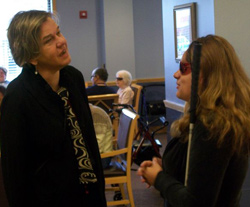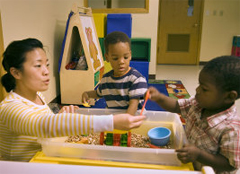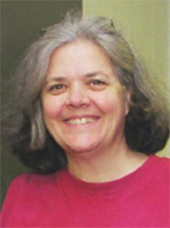by Beth Finke
 I was a bad cook when I could see. That didn’t change when I lost my sight. I still can’t cook, but now, I have an excuse.
I was a bad cook when I could see. That didn’t change when I lost my sight. I still can’t cook, but now, I have an excuse.
Or at least I did have an excuse, until a story about Laura Martinez came out in the Chicago Tribune a couple years ago. Martinez was 25 years old at the time and attending the prestigious Le Cordon Bleu culinary program at the Cooking and Hospitality Institute of Chicago. And, oh yeah, she just happens to be blind. From the story:
“I’d never worked with a blind student before,” said Karine Bravais-Slyman, who heads the institute’s general education department, “but Laura did incredibly well in the kitchen. She showed many students that even with this type of impairment, she could still do better than students who have their sight.”
Okay. I admit it. It’s not lack of sight that keeps me from being a good cook. It’s lack of talent. When renowned Chicago chef Charlie Trotter heard about Laura Martinez, he was so intrigued that he visited her at the Chicago Lighthouse for the Blind, where she worked in the cafeteria kitchen. He said he was watching her work and saw how she handled things with her hands, touching for temperature and doneness, and when he ate her food, he thought it was “quite delicious.”
The two of them got to talking, and when she told Chef Trotter about her dreams, he asked her what she might think about working at Charlie Trotter’s.
You read that right. Charlie Trotter asked her to work for him. He also offered to help with her tuition at cooking school. When I finally met Laura Martinez at a speaking engagement last year, she’d been working at the restaurant a year already. Her speciality? Risotto.
On Monday, May 7, the James Beard Foundation honored Charlie Trotter with its 2012 Humanitarian of the Year Award. The Charlie Trotter Culinary Education Foundation works with staff and purveyors to donate time and resources to its fundraising dinners, and 100% of the money raised goes directly to scholarships for worthy students entering into culinary programs and professions — like Laura.
I have no idea who Chef Trotter’s competition was for this year’s award, but I’d say he deserves it. I’m sure Laura Martinez agrees! And talk about paying it forward — in her spare time (!) Laura volunteers to teach a cooking class at Friedman Place, a non-profit Supportive Living Community for Chicago adults who are blind and visually impaired. Congrats on the award, Charlie. We’re proud of you. And of Laura.
 Last week our local NPR affiliate aired a story featuring members of our staff here at Easter Seals Southeast Wisconsin.
Last week our local NPR affiliate aired a story featuring members of our staff here at Easter Seals Southeast Wisconsin. 






 Five years ago I sat on a panel with
Five years ago I sat on a panel with 


 I was a bad cook when I could see. That didn’t change when I lost my sight. I still can’t cook, but now, I have an excuse.
I was a bad cook when I could see. That didn’t change when I lost my sight. I still can’t cook, but now, I have an excuse.